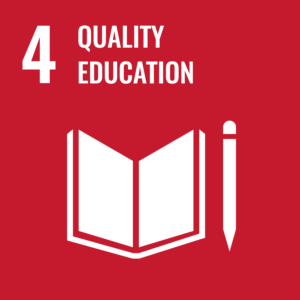SDG4: Quality Education
In supporting our work beyond the campus, the University’s focus is on developing a quality workforce to meet the current and future needs to support this target. We achieve this through the development of new Early Childhood Graduate Competencies. Dr Eunice Lumsden’s work with the Department of Education is developing a new qualification levels in early years, which develops graduate competencies in early childhood that have international applicability to meet the national and international workforce developmental needs in this area. As a result, she worked democratically with the Early Childhood Studies Degree Network to develop the competencies, which are now embedded across nearly 30 HEIs across England, have been included in the QAA Benchmark Statement for Early Childhood and recognised as a ‘Full and Relevant’ qualification by the Department of Education. In 2020, 184 of our students graduated with qualifications that entitled them to teach at primary school level.

Our International Education (Top Up) has study pathways in early years, education and leadership and management in early years, specifically focused on providing higher level study opportunities for international students who are planning to be working in this area.
The University of Northampton works closely with local partners and other higher education institutions to inspire young people to consider entering higher education. Our Uni-connect programme is delivered with the Universities of Bedfordshire and Hertfordshire and supports young people from low participation neighbourhoods to explore studying in higher education with 16,553 pupils supported in the last two years. Our wider schools’ and community engagement work supports staff to take the University out into communities through public lectures, events such as the Big Bang and Car Crash as well as providing a range of learning resources, CPD, and careers advice. We engage young people in University life providing an annual programme of subject specific public lectures aimed at Year 12 and 13 pupils, Roots to empathy supported the development of young people by recognising attachment between infants and their parents and public lectures on the leather heritage of Northamptonshire raising the profile of this important industry. In the last academic year 46% of students starting a degree were first generation students.
The University has a collaborative arrangement with the Public Library service to offer computer access to communities. The University’s Library provides access to the physical book collection which is open to visitors, either on a day pass or, if they want to borrow, on an Associate membership. Both types of access are free. We also provide open access material that is available to the public e.g. the Skills Hub. The University provides public access to several archives containing local and national materials.
The University encourages staff engagement as school governors, joining senior management teams in schools and supporting local educational institutions to encourage lifelong learning by granting ‘community leave’ as an entitlement to all staff.
Please check out our latest research for SDG4: Quality Education